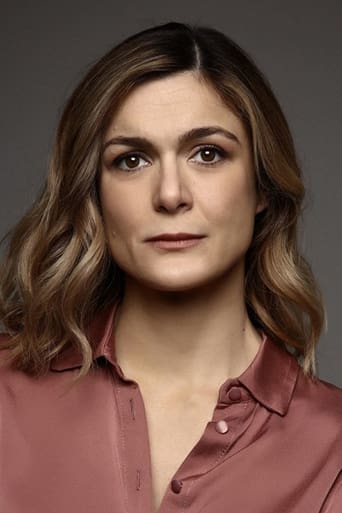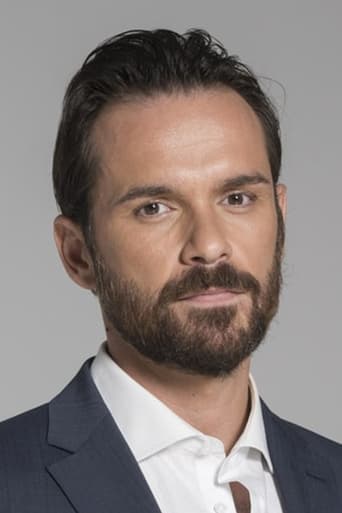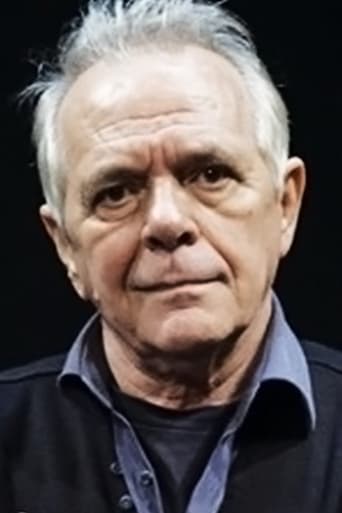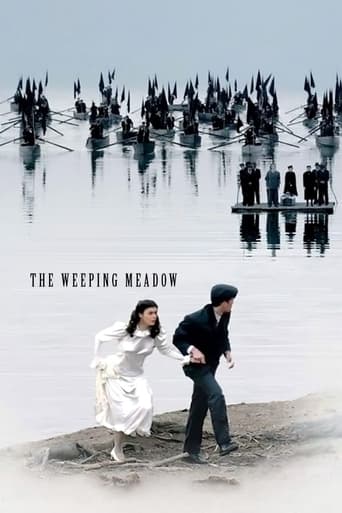
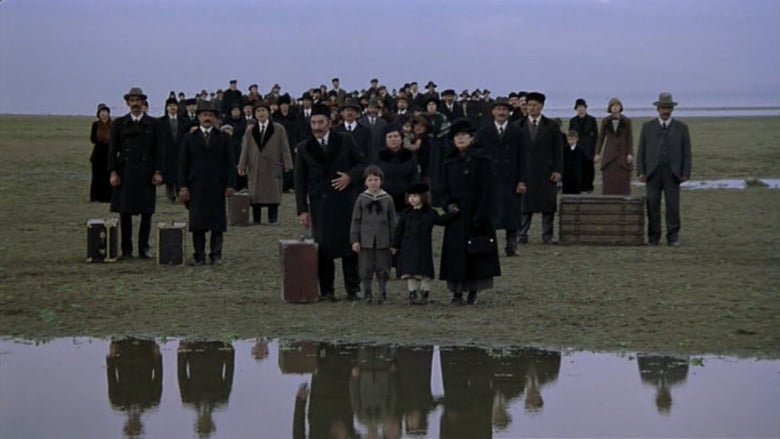
The Weeping Meadow (2004)
The first part of an incomplete trilogy telling the story of the greek people. The film begins in 1919, with Greek immigrants from Odessa arriving near Thessaloniki. Led by the charismatic Spyros, they establish a new settlement in the delta of a river. The youngest of the settlers are Spyros' son Alexis and an orphan from Odessa, Eleni. A strong, almost incestuous affection develops between the teenagers, resulting in twins who are given to a foster family. Also standing in the way of love is Spyros, determined to take his foster daughter as his wife. The lovers then decide to flee the village, persecuted by their father, leading a life of exile. As Alexis joins a group of musicians planning to go to the United States, Eleni regains custody of the twins. Angelopoulos, as in previous films, looks at the sacrifice of civilians confronted by the workers' demonstrations of 1935, the rule of Metaxas' fascist junta and forced emigration to America, and finally the civil war of 1944-1949.
Watch Trailer
Cast


Reviews
I love this movie so much
Expected more
The film creates a perfect balance between action and depth of basic needs, in the midst of an infertile atmosphere.
The story, direction, characters, and writing/dialogue is akin to taking a tranquilizer shot to the neck, but everything else was so well done.
Perhaps the most emotional of Angelopoulos' films so far. While it occasionally flirts with melodrama, it's ultimately heartbreaking while losing none of the film-maker's usual formal rigor and visual beauty.A couple try to find a way to stay together in the face of wars, both civil and international, as well as fighting small town prejudice and rejection. Not an easy film, and some of the history may be confusing unless you happen to be up on the history of Greece in the 20th century (I'll admit I'm not), but very worth the time and effort.Re the DVD: As with most of Angelopoulos' films, the edition you want to find if you can is the Greek 'New Star' release (it has English subtitles). This line was supervised by Angelopoulos personally, and the image is definitely a step up from the US release. The sad things is, inexplicably, those editions were only released for a short while, and they've become very hard to find.
I feel conflicted about this film - it is one of the most beautiful films I've seen, and provides insightful looks into a lost culture. There was an early scene of men in caps and moustaches sitting around a table, with a woman serving, and an accordion playing, that brought tears to my eyes, just because of the way it captured a way of life that must be incomprehensible to many today. It presents the lives of the characters as being inextricably bound up with the life of the village, another lost concept in today's world. Symbolism is always fun but it seemed a little dated. The fatal flaws of the movie to me were the lack of any compelling dramatic drive, and a total lack of humor. I never felt like I knew any of the characters beyond very basic universal things like grieving over the loss of a loved one, etc. The people were stick figures in the director's tableaux involving natural disasters, war, etc. The film was just one beautiful tragic scene after another, with no involving narrative thread and no humanity. As a result, it seemed very abstract, irrelevant to the lives of real people. In the end, I was too bored to finish watching it.
Theo Angelopolous, the Greek director, undertakes the colossal task of putting in a film some thirty years of history in his country. The director has a poetical way to present his story, which was written in collaboration with some of the best minds of the business, namely, Tonino Guerra, Giorgio Silvani and Petros Markaris, one of our own favorite Greek writers.The result is a complex canvas in which Mr. Angelopolous paints for us, the viewer, in dark colors that gives us an idea of what the country went through during that period. In a way, the director seems to be taking an outside position in recounting the tragedy his country lived by photographing in long shots almost every frame of the film. Of course, this being his style, it suits the poetical way in which he conceives the basic idea.There are lots of moments in the film that take the viewer's breath away by the beauty of the composition of a particular scene. It's clear the director uses a lot of symbolism in trying to get his point across. The opening scene with the returning people from the Odessa massacre being one of the most effective things in the film. The rowing boats carrying people affected by the flood is another. The many white sheets waving in the wind, are just the highlights of the story, the way Mr. Angelopolous conceives it.The actors act as an ensemble. Alexandra Aidini, who plays Eleni, the woman at the center of the tragedy, makes quite an impression. The excellent fading cinematography by Andreas Sinanos gives a rich texture to the film, as well as the music score by Eleni Karaindrou, that greatly enhances the mood of it.While this film is definitely for a general public, it shows great moments of brilliance created by Theo Angelopolous working at his best.
I had watched years ago some older films of Aggelopoulos and i was expecting a slow movie, with minimal dialogues, many symbolisms, weak plot and superb photography. I got exactly what i expected and something more: i left the theatre with an extreme satisfaction.The film: Greece roughly between 1920 and 1950 (but it is so current and contemporary because it deals with global, recurring themes). The life of the nation through events: national catastrophes, refugees, social and political unrest, world and civil wars. The life of the person through emotions: love, lust, pride, hope, love, desperation, ambition, love, death. And many symbolisms and extremely powerful and beautiful scenes with references from ancient myths to current international affairs. And rain, lots of rain :-) The plot and the development of the characters may appear weak. We are used to ready meals from the business of cinema, which overwhelm us with fast dialogues, "strong" performances and "exciting" situations. And that's fine. But cinema and people need also the approach of Aggelopoulos, we need some space and time, to reflect and realise our existence. "To Livadi pou dakryzei" gives more freedom and time to the viewer to participate with his feelings and memories and thoughts. That's exactly interactive art.These are some of my interpretations of some scenes: village flooding (Climate Change and the forces of Nature), immigration/separation (departure of my girlfriend), mother crying over her soldier sons dead bodies (this is a real war scene, not the computer games style). You will identify with other scenes (everyone has an opinion, right ?) and you will feel alive.I am grateful to Aggelopoulos for giving me the chance to look inside myself, remember, sigh, think.


